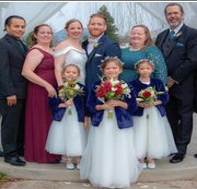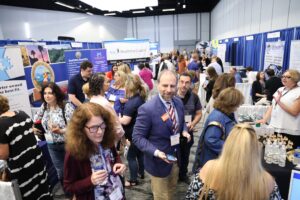By Cassandra Ellis
On being a mother and a stenographer and how stenography can impact your life:
When I was younger and my children were young, I could adjust my schedule most days and weeks and months to accommodate all their needs, doctors’ appointments, ball games, and music recitals. You name it, and I could be there. Once in a while I would need to have somebody there to pick them up and rarely somebody to drop them off, but overall, I could do it all.
Over the years, something changed: more competition for the kind of work I loved, more people offering my same services of realtime and immediate roughs at a lower page rate, and more firms that did not want to have to schedule around my schedule, all of that leading to taking less time off and throwing myself deeply into my career. And even that was all right. The girls were growing up; they did not need us as much. At 18 and 19, they could take care of themselves.
The opportunity to travel overseas came up for Joseph (CLVS videographer) and me, and we were intrigued. The pay was good, the chance to see and work in other parts of the world; who could resist? Well, I am sure lots of people, but not me. We spent several years traveling the world, all around Asia, Europe, and even the Caribbean: depositions, arbitrations, disability conferences, European Union, United Nations. If it was overseas, we would go and have a great time.
But that overseas work, combined with local work, can take a toll on a body, and at the age of 42, having spent two weeks in Asia on daily copy, flying home and taking a week of “surprise” daily copy, where every day I asked at the beginning of the day: “When do you think you’ll need this?” And counsel each day said: “Regular delivery. There won’t be a rush.” And for three days in a row, at the end of each day, when it was too late to arrange any help: “Can we get that tomorrow?” Ten-hour days, 300 plus pages per day, and by Wednesday night, as I was working on that third daily-copy transcript, I could not breathe.
I was so tired all I wanted to do was sleep, but I could not lay down without unbearable pain. I paced the room; I sat down and did 20 pages. I tried to lay down; I sat down and did 20 pages. Thursday was another realtime job, scheduled to go all day, and I was struggling to get this third day out, and I recognized the signs. It’s not a heart attack, I told myself. I’m only 42. It’s a panic attack. I’m overtired and it’s just a panic attack. But at 6 a.m. I felt like it was something more. I contacted the firm and told them they would need to get somebody else. I needed to go to the ER.
So here I sat in the ER, and they have run all the tests. The doctor comes in and says, “We do not believe you’re having a heart attack, but we need to observe you for 24 hours.” I said, “You’re just going to watch me for 24 hours? That’s silly. I’ll know if the symptoms come back.” I went home and finished my job and felt mostly fine. I had two other jobs on my desk, and I was able to finish them up. And, surprise, we had a long weekend, Friday to Monday, off. Not a page on my desk to be found.
We drove down south to an old house Joe was restoring. He had paid somebody to frame in some walls for a bathroom while we had been traveling, and he had drawn out the diagram and marked the space with tape where the walls were supposed to be built and a note to the workers where to build the walls. And when we got down south all the walls were wrong. He calls the contractor and tells him the walls will need to be rebuilt, whereupon the contractor starts to yell at my husband and tells him the walls are exactly where they are supposed to be and he won’t change them and that he won’t complete the rest of the work because how dare he tell him how to do his job. We think he might have been drinking, but no proof. He did call the next day to apologize and agreed to redo the walls. But by then, as I’m listening to this exchange, I rush to the bathroom and begin vomiting. I cannot stop for the longest time.
Joe immediately hangs up, and when I can finally stop, he brings me to the ER. They agree with the previous doctors up north. “We don’t think you’re having a heart attack. All your tests are normal. Your heartbeat is strong. But we would like to observe you for 24 hours.” This time I agree and stay in the hospital. After 23 hours of perfectly banal tests, we are in the homestretch. It’s just a panic attack. And after the test, at hour 23, the nurse comes in and says to me: “Oh, my God, you’re having a major heart attack.”
“Yes,” I say calmly, “We thought I might be.” Turns out, though my heart was strong, one of my arteries was 95 percent occluded. They could not stent it, because the artery was too small and the stent was too large and it would push the one artery against the others and cause further occlusions. The advice the doctor gave me was “Wait until you have another heart attack.” I did wait, nearly seven years, but it was not the clogged arteries that almost killed me, it was anemia. And that is a story for another day.
The moral of my story is that stenography can be a wonderful and rewarding career. You can mold it to fit your life and your lifestyle. You can also let it take over your life. My two cents: let your career work for you; do not work for your career. Being a court reporter can be a great opportunity to create the life you want with your children, with your family, and nearly 30 years in, being a court reporter is my peaceful place. It has allowed me, in this pandemic world, the opportunity to be home with my grandchildren while we navigate Zoom school and I play teacher; it allows me to drive cross-country to see my daughter who is having her first baby; and it allows me to help my youngest when she needs me. Because the one thing I learned, in all of this time, is that family is the most important thing in life and if you do it right, court reporting is the best career for a mother, young or old.
Cassandra Ellis, RPR, is a freelancer and CART captioner in Silver Spring, Md.




